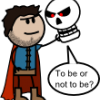DefinitionsRe: fireside7
To keep the length of each post short, I am only going to focus on the main point that would dissolve the misunderstanding. We don't have the same definitions for the word "conflict". Consider the definitions:
Conflict[1] is drama between two opposing forces.
[Link]Conflict[3] is situation where two or more intentions lead to states that cannot coexist.
We know that the Conflict[3] and Conflict[1] defines two sets of things, some of the things belong to both sets, some belong only to one. For now, consider the types of Conflict[1], and see their membership in Conflict[3]:
a) Character Struggling Against Another Character -> Member of Conflict[3]
b) Character Struggling Internally With Self -> Member of Conflict[3]
c) Character Struggling Against Forces of Nature -> Not a member of Conflict[3]
d) Character Struggling Against Society -> Can be a member of Conflict[3]
e) Character Struggling Against Fantasy/Supernatural/Technology -> Can be a member of Conflict[3]
(* Note that there are additional situations that belong to Conflict[3] but not Conflict[1]: the above is not evidence that Conflict[3] is a subset of Conflict[1].)
Because the definitions are fundamentally different, Conflict[3] cannot be nicely defined by terms of Conflict[1]. As an analogy, imagine the difference between the orthogonal coordinate system and the polar coordinate system. An object that is easy to define in one system may not have a simple boundary in another system. The primary task is to know how coordinates of one system maps to another.
Once it is recognized that such a mapping exists, the discussion can continue, regardless what definition you use. Regardless whether a point is described in polar or rectangular cordinate, it is still a point in space.
Minor DetailsThe following are branching points of the discussion:
o In definition [1], how do you define "force". Do you know whether definition [1] includes things you want and excludes those you don't? Do you know whether definition [1] contains unintentional meanings? How do you know that definition [1] is an objective definition? One that includes what you want to talk about, but also many other things that you would have to choose to ignore to make the definition meaningful? How would one inject more science into defining words? How would you go about testing whether a definition is valid?
o In definition [1], since Conflict is defined as a type of drama, what
other types of drama are there? If you read the sentence the same way I do, the statement implies that there exist drama that is void of conflict. To question whether concrete examples of drama without conflict exist, is to question the validity of the definition. Accepting that definition means you understand that there are dramas without conflict.
o An example of drama without conflict[1] is Hachi, which I gave earlier. It main plot is about a dog that kept waiting for its departed owner. The story expresses loyalty by showing behaviors due to loyalty. To the dog, there may not be any opposing force, it is just a way of life. But its persistence make the audience question what they would do themselves. If you change the audience such that the audience is used to this type of loyalty, the movie would be incredibly boring: The audience would think, "Why is that interesting? I do that every day. Doesn't everyone do that?" Here, you see that the quality that attracts the audience does not reside in the story, but in the contrast between the events in the story and the audience's expectation.
Therefore, you actually have to agree that there are examples of drama without conflict. A summary of the reasons:
1. Hachi
2. The author of
this knew it, if she knew what she was talking about.
By citing the second reason I am not endorsing the article. I don't think that the definitions there are meaningful or inspirational. For instance, can you justify why each type of conflict[1] is described as a struggle? Why can't there be a conflict[1] that has no struggle? Why do conflicts always involve a character? When you read something like that you know it is aimed at casual thinking who have no clue what conflict could mean, so any clue would be a step up. In other words, the article is a simplification of the truth. It tells you what looks nice, what looks palatable. It is not a critical article.
Think about how you would have to do to critique a definition. Is it only restricted to citing authority? Majority rule? What is the science in definitions?





